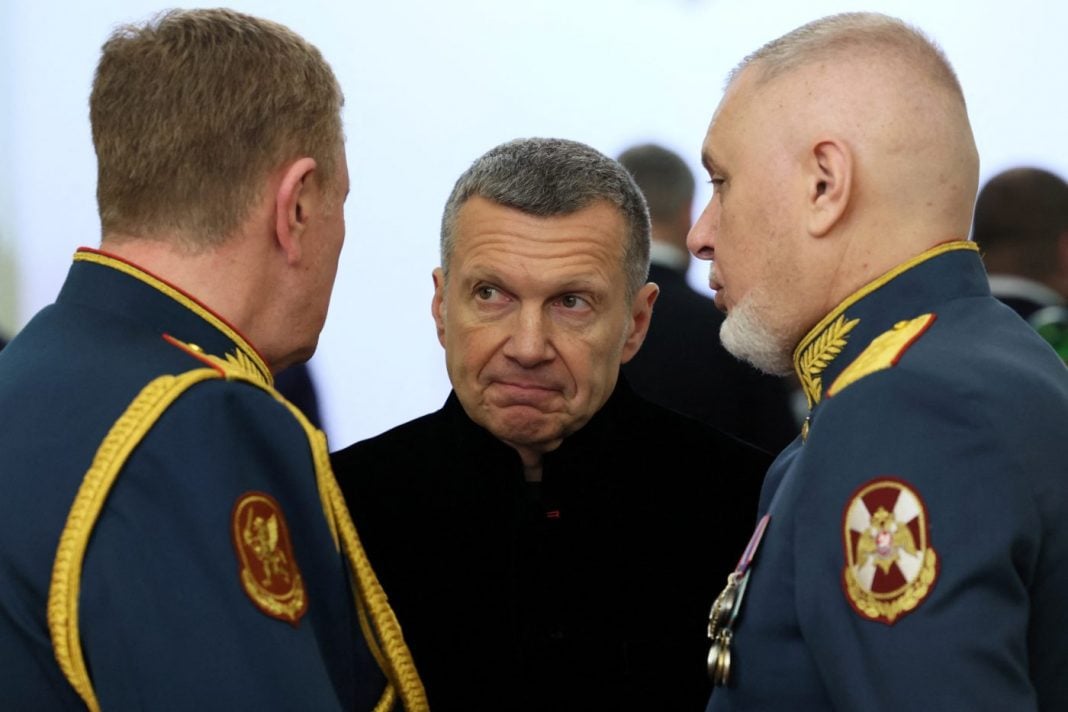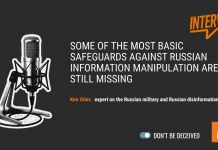Russian propagandists are parroting the Kremlin’s apparent indifference to Trump’s attacks.
By Julia Davis, for CEPA
US President Donald J. Trump surprised many on September 23 with a social media post asserting that “Russia has been fighting aimlessly for three and a half years a War that should have taken a Real Military Power less than a week to win,” compared it to “a paper tiger,” slammed Russia’s faltering economy and surmised that Ukraine can take back its land by military means.
Trump concluded his post by stating, “I wish both Countries well. We will continue to supply weapons to NATO for NATO to do what they want with them. Good luck to all!”
Kremlin officials were rather subdued in their reactions to the statement. During a radio interview, Vladimir Putin’s spokesman Dmitry Peskov quipped: “Russia is in no way a paper tiger, it’s more closely associated with a bear—and there are no paper bears.”
While the Kremlin’s top propagandists certainly pouted about Trump’s “hurtful” comments and fired back with their own insults, they couldn’t argue with what he said about Russia’s creeping advances in Ukraine, successful attacks against their oil refineries (cars are queuing for gas across the country, including Moscow), or the state of the Russian economy, especially since these topics have been finding their way even onto the tightly-controlled airwaves.
Kremlin mouthpieces largely discounted Trump’s words, with experts quick to point out that the shift in Trump’s rhetoric did not amount to a tangible change in US policy. During Wednesday’s broadcast of a radio show , Full Contact, host Vladimir Solovyov grumbled about the US president’s insults, but noted, “Trump didn’t say he is taking Ukraine’s side.”
Instead, multiple state media experts put a positive spin on the president’s statement (their views shared by some Western Europeans) by arguing his words revealed his willingness to walk away from the conflict, unloading it onto Europe and Ukraine. While he has promised to continue selling weapons to NATO, in order to maintain Ukraine’s ability to defend itself, Ukraine’s defense has also been hampered by the US quietly pausing some arms sales to Europe. Moscow’s mouthpieces routinely express their firm belief that Russia can keep pushing forward until the Europeans run out of the means to keep supporting Ukraine.
Get the Latest
Sign up to receive regular emails and stay informed about CEPA’s work.
Emboldened by this belief, head of the State Duma Defense Committee Andrey Kartapolov recently threatened Poland. State media’s experts and leading propagandists frequently menace European countries and insist that the United States would not defend them in case of a direct conflict with Russia, and that it will disregard NATO’s Article 5.
On September 25, after fuming about Trump’s harsh words, Solovyov admitted: “I’m very grateful for the fact that Biden didn’t come to power . . . objectively, yes, it’s been beneficial to us. From the time Trump was elected, there have been no new sanctions.”
During the previous day’s broadcast of the TV program The Meeting Place, Gevorg Mirzayan, research fellow of the Russian Academy of Sciences’ US and Canadian Studies Institute, dismissively implied that Trump is Putin’s apprentice, who has failed to complete his assignment of convincing Ukraine to capitulate and persuading Europe to accept this outcome.
Mirzayan said, “What happened is the most logical conclusion of what came out of the Alaska summit. At the conclusion of the summit, Vladimir Putin and Donald Trump agreed on a certain formula for a resolution. What was required of Trump was to make Europe and Ukraine accept it. Trump failed to complete his homework.” He suggested that the American president’s insults towards Russia were a mere smokescreen, which is why they were mainly disregarded by the Kremlin.
During Thursday’s airing of Full Contact, Solovyov noted: “Since we are not a paper tiger, but a bear — as Dmitry Sergeyevich Peskov correctly noted — then they have a problem in their forest. When they point out, ‘President Trump is very disappointed, displeased and upset by Putin,’ perhaps Trump should be pondering whether Putin is disappointed and upset with him.”
By Julia Davis, for CEPA
Julia Davis is a columnist for The Daily Beast and the creator of the Russian Media Monitor. She is a member of the Academy of Television Arts and Sciences, the Screen Actors Guild, and Women In Film.
Europe’s Edge is CEPA’s online journal covering critical topics on the foreign policy docket across Europe and North America. All opinions expressed on Europe’s Edge are those of the author alone and may not represent those of the institutions they represent or the Center for European Policy Analysis. CEPA maintains a strict intellectual independence policy across all its projects and publications.





